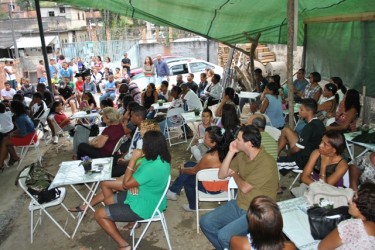In the 1990s Ronaldo Monteiro was convicted for extortion by kidnapping and sentenced to 28 years in prison in Brazil. While serving his time, Monteiro and some fellow inmates were concerned for the wellbeing of their families in their absence. They responded to the situation by setting up a workshop inside the jail where they recycled and sold paper. A portion of the profit went towards improving their equipment, and the rest was shared among their families. That's how project Uma Chance (A Chance) started.
The Center for Digital Inclusion [1] (CDI) began offering short courses on information technology to detainees. Monteiro enrolled and learned fast; he was soon invited to teach as well. The project expanded to other penitentiaries, and family members were also invited to participate.
In this documentary by Mixer Productions [2], Monteiro explains how he pursued a new path from inside jail and turned his life around (subtitles in English):
 [3]
[3]Event to celebrate the third year of ‘Growing up with Citizenship' at CISC. Photo by Danny Silva, used with permission.
In 2002, while still incarcerated, Monteiro created the Center of Social and Cultural Integration [4] known as CISC-Uma Chance, which offers courses on IT and recycling to communities of Tribobó, in São Gonçalo [5], in Greater Rio de Janeiro. They work to make opportunities available to more people, as CISC develops activities in cooking, citizen awareness, healthy lifestyle and preparation for university.
In 2003, Monteiro was granted parole.
New beginnings
In 2006, Monteiro went one step further and created the impressive Incubadora de Empreendimentos para Egressos [6] (IEE) (Incubator of Small Businesses for Ex-Detainees). Aiming for social reintegration of young offenders, detainees and former detainees, the incubator fosters ideas with dynamic lessons on entrepreneurial skills and management. The IEE seeks to break the cycle of repeat-offending by offering a chance to men and women who are often turned down by society.
The project has earned support from Petrobras since 2006, and has partnered with Ashoka, McKinsey & Company and several universities. Because of this work, Monteiro was named an Ashoka fellow [7].
As Monteiro says in the documentary above, serious projects “transform lives and make men work” instead of resorting to crime and armed violence. In a TEDx Sudeste [9] [pt] presentation in 2010, Monteiro explained that rehabilitation should involve education, and opportunities and incentive for pursuing dreams.
The penitentiary system in Brazil has been repeatedly been a subject of criticism by human rights groups. A report [10] by Amnesty International in 2010 said detainees “continued to be held in cruel, inhuman or degrading conditions”, often facing overcrowded facilities.
When detainees are released, they carry a heavy stigma, and harsh experiences in jail hardly contribute to rehabilitation. But with the proper incentive and inspiration, detainees may find options of new paths to rebuild their lives.
